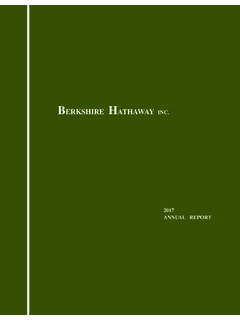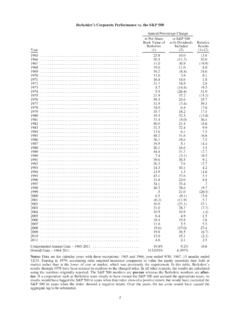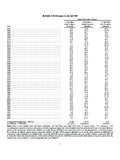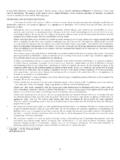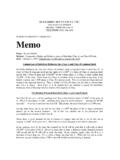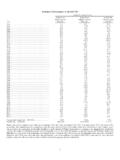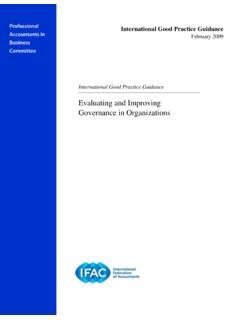Transcription of CORPORATE GOVERNANCE GUIDELINES
1 BERKSHIRE HATHAWAY INC. CORPORATE GOVERNANCE GUIDELINES The Board of Directors has adopted the following GUIDELINES to promote the effective GOVERNANCE of the Company. The Board will also review and amend these GUIDELINES as it deems necessary or appropriate. On behalf of the Company s shareholders, the Board is responsible for overseeing the management of the business and affairs of the Company. The Board acts as the ultimate decision-making body of the Company, except on those matters reserved to or shared with the shareholders of the Company under the laws of Delaware. 1. Director Qualifications In choosing directors, the Company seeks individuals who have very high integrity, business savvy, shareholder orientation and a genuine interest in the Company.
2 The Company is required to elect a majority of directors who are independent. All references to independent directors in these GUIDELINES are to directors who are independent according to the criteria for independence established by Section 303A of the New York Stock Exchange Listed Company Manual. The Board does not have limits on the number of terms a director may serve. The Board does not have any retirement or tenure policies that would limit the ability of a director to be nominated for reelection. The GOVERNANCE , Compensation and Nominating Committee is responsible for nominating directors for election or reelection. 2. Board Size and Committees The Board presently has 12 members (two management directors, two non-management but not independent directors and eight independent directors).
3 Under the By-Laws of the Company, the Board has the authority to change its size, and the Board will periodically review its size as appropriate. The Board has three committees: (i) Audit; (ii) GOVERNANCE , Compensation and Nominating; and (iii) Executive. The Audit and GOVERNANCE , Compensation and Nominating Committees each consist solely of independent directors. The Board may, from time to time, establish and maintain additional or different committees, as it deems necessary or appropriate. 3. Voting for Directors Any nominee for director in an uncontested election ( , an election where the number of nominees is not greater than the number of directors to be elected) who receives a greater number of votes withheld from his or her election than votes for such election shall, promptly following certification of the shareholder vote, offer his or her resignation to the Board for consideration in accordance with the following 2 procedures.
4 All of these procedures shall be completed within 90 days following certification of the shareholder vote. The Qualified Independent Directors (as defined below) shall evaluate the best interest of the Company and its shareholders and shall decide on behalf of the Board the action to be taken with respect to such offered resignation, which can include: (i) accepting the resignation, (ii) maintaining the director but addressing what the Qualified Independent Directors believe to be the underlying cause of the withhold votes, (iii) resolving that the director will not be re-nominated in the future for election, or (iv) rejecting the resignation. In reaching their decision, the Qualified Independent Directors shall consider all factors they deem relevant, including: (i) any stated reasons why shareholders withheld votes from such director, (ii) any alternatives for curing the underlying cause of the withheld votes, (iii) the director s tenure, (iv) the director s qualifications, (v) the director s past and expected future contributions to the Company, and (vi) the overall composition of the Board, including whether accepting the resignation would cause the Company to fail to meet any applicable SEC or NYSE requirements.
5 Following the Board s determination, the Company shall promptly disclose publicly in a document furnished or filed with the SEC the Board s decision of whether or not to accept the resignation offer. The disclosure shall also include an explanation of how the decision was reached, including, if applicable, the reasons for rejecting the offered resignation. A director who is required to offer his or her resignation in accordance with this Section 3 shall not be present during the deliberations or voting whether to accept his or her resignation or, except as otherwise provided below, a resignation offered by any other director in accordance with this Section 3.
6 Prior to voting, the Qualified Independent Directors will afford the affected director an opportunity to provide any information or statement that he or she deems relevant. For purposes of this Section3, the term Qualified Independent Directors means: (a) All directors who (1) are independent directors (as defined in accordance with the NYSE CORPORATE GOVERNANCE Rules) and (2) are not required to offer their resignation in accordance with this Section 3. (b) If there are fewer than three independent directors then serving on the Board who are not required to offer their resignations in accordance with this Section 3, then the Qualified Independent Directors shall mean all of the independent directors and each independent director who is required to offer his or her resignation in accordance with this Section 3 shall recuse himself or herself from the deliberations and voting only with respect to his or her individual offer to resign.
7 The foregoing procedures will be summarized and disclosed each year in the proxy statement for the Company s annual meeting of shareholders. 3 4. Director Responsibilities The basic responsibility of the directors is to exercise their business judgment to act in what they reasonably believe to be in the best interests of the Company and its shareholders, and to conduct themselves in accordance with their duties of care and loyalty. Directors are expected to attend Board meetings and meetings of the committees on which they serve, and to spend the time needed to carry out their responsibilities as directors, including meeting as frequently as necessary to properly discharge those responsibilities.
8 Directors are also expected to review in advance all materials for the meetings of the Board and the Committee(s) on which they serve. 5. Director Access to Management and Advisors Each director has full and free access to the officers and employees of the Company and its subsidiaries. The Board and each of its Committees has the authority to hire independent legal, financial or other advisors as it may deem to be necessary without consulting or obtaining the advance approval of any officer of the Company. 6. Board Meetings The Chairman of the Board is responsible for establishing the agenda for each Board meeting. Each director is free to suggest items for inclusion on the agenda and to raise at any Board meeting subjects that are not on the agenda for that meeting.
9 At least once a year, the Board reviews the Company s long-term plans and the principal issues that the Company will face in the future. 7. Executive Sessions The non-management directors meet in regularly scheduled executive session ( , without directors who are members of management). The independent directors also meet in a separate executive session consisting solely of independent directors at least once a year. The presiding director at each executive session is chosen by the directors present at that meeting. 8. Director Compensation Only directors who are neither an employee of the Company or a subsidiary nor a spouse of an employee receive compensation for serving on the Board.
10 Director fees are nominal and are limited to immediate compensation. Changes in the form and amount of director compensation are determined by the full Board, taking into consideration the Company s policy that the fees should be of no consequence to any director serving the Company. The Board critically reviews any amounts that a director might receive directly or indirectly from the Company, as well as any charitable contributions the Company may make to organizations with which a director is affiliated, in determining whether a director is independent. The Company does not purchase directors and officers liability insurance for its directors or officers. 9. Orientation and Continuing Education All new directors receive an orientation from the Chief Executive Officer and are expected to maintain the necessary level of expertise to perform his or her 4 responsibilities as a director.



